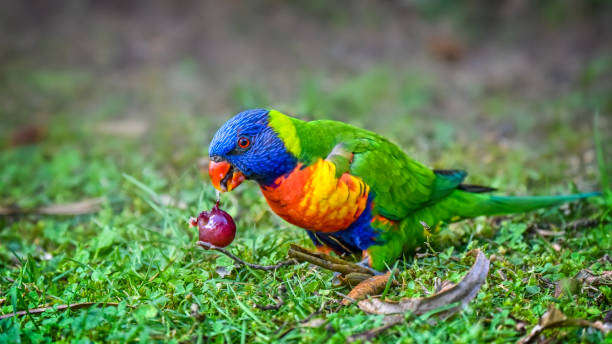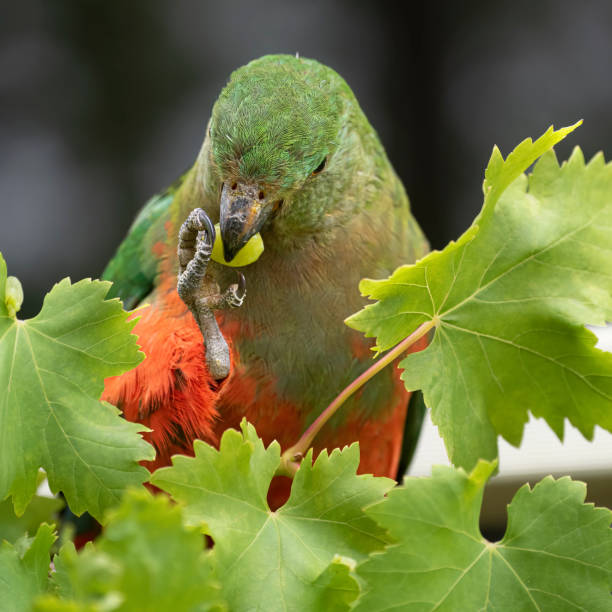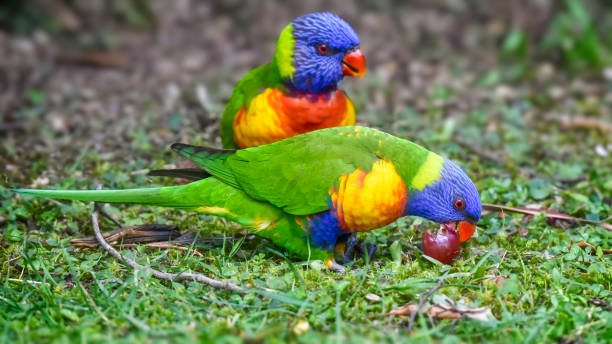Can Parrots Have Grapes?: Are They Safe and Healthy for Parrots?

Grapes are a popular fruit among parrots, and many parrot owners wonder if they can safely include grapes in their bird’s diet. While grapes are generally not toxic to parrots, there are some important considerations to keep in mind before offering them to your feathered friend.
Yes, parrots can have grapes. Grapes are safe for parrots and can be a healthy addition to their diet when given in moderation. They are rich in essential vitamins and minerals, including vitamins A, C, and K, as well as calcium, potassium, and iron, which support various aspects of a parrot’s health, such as immune function, bone strength, and cardiovascular health. Grapes also provide hydration due to their high water content and can aid in digestion with their dietary fiber. However, it’s important to feed grapes in moderation because their high sugar content can lead to weight gain and other health issues if consumed excessively. Always ensure grapes are thoroughly washed to remove any pesticides or chemicals before offering them to your parrot.
Are Grapes Safe for Parrots?
Grapes are not inherently toxic to parrots, but they do contain high fructose levels that can be detrimental if consumed excessively. Eating too many grapes can lead to weight gain and nutritional deficiencies if other essential foods are neglected. It is crucial to feed grapes in moderation and not rely on them as the primary source of nutrition.
Are Grapes Beneficial to Parrots?
Grapes are rich in nutrients that can benefit parrots. They contain antioxidants, manganese, potassium, vitamin C, and proteins, which are essential for maintaining overall health. These nutrients can help with bone growth, hormone development, and immune function, making grapes a nutritious treat for parrots.
Why You Should Not Feed Your Parrot Lots of Grapes
Feeding your parrot large amounts of grapes can lead to several health issues:
- Weight Gain: Grapes are high in sugar, which can result in obesity and increase the risk of diseases.
- Vitamin Deficiency: Neglecting other essential foods in favor of grapes can lead to nutritional deficiencies.

Can Parrots Eat Grapes’ Seeds and Peels?
Grape seeds are generally safe for parrots, but they should be broken into smaller pieces if your bird is too small. Grape peels also contain antioxidants and nutrients, but they should be thoroughly washed to reduce pesticide contamination. However, it is recommended to avoid feeding grape peels due to the risk of pesticide residue.
How to Give Your Parrot Grapes
To ensure your parrot enjoys grapes safely:
- Wash Grapes Thoroughly: Grapes are one of the most contaminated fruits, so it is essential to wash them thoroughly to remove pesticides.
- Feed in Moderation: Limit the amount of grapes given to your parrot based on their size. Small parrots should have half a grape, while larger parrots can have a whole grape.
- Avoid Daily Feeding: Grapes should not be given daily as they can lead to nutritional deficiencies if other essential foods are neglected.
- Offer Variety: Include other fruits like berries in your parrot’s diet to ensure a balanced and varied diet.

Can Parrots Have Grapes?
Parrots are known for their bright plumage, intelligence, and sociability, making them popular pets. Their diet is crucial for their health and well-being. One common question among parrot owners is whether parrots can eat grapes. This comprehensive guide explores the benefits and potential risks of feeding grapes to parrots, ensuring that your feathered friend stays healthy and happy.
Nutritional Benefits of Grapes for Parrots
Grapes are a nutritious fruit, packed with vitamins and minerals that can benefit your parrot. They are rich in vitamins A, C, and K, as well as essential minerals like calcium, potassium, and iron. These nutrients are vital for a parrot’s overall health, supporting their immune system, bone strength, and cardiovascular health.
Vitamin A is particularly important for parrots, as it supports vision, skin health, and reproductive health. Vitamin C acts as an antioxidant, protecting cells from damage and boosting the immune system. Vitamin K plays a crucial role in blood clotting and bone metabolism.
Hydration and Digestion
Grapes have a high water content, making them an excellent source of hydration for parrots, especially during hot weather. Proper hydration is essential for maintaining bodily functions and preventing dehydration.
Additionally, grapes contain dietary fiber, which aids in digestion. Fiber helps maintain healthy bowel movements and prevents constipation, ensuring that your parrot’s digestive system functions smoothly.
Antioxidants and Disease Prevention
Grapes are loaded with antioxidants, such as resveratrol, flavonoids, and quercetin. These compounds help neutralize free radicals, reducing oxidative stress and inflammation. By incorporating grapes into your parrot’s diet, you can support their long-term health and reduce the risk of chronic diseases.
Resveratrol, found in grape skins, has been studied for its potential to improve cardiovascular health and protect against certain cancers. While more research is needed to understand its full benefits, including it in your parrot’s diet in moderation can be advantageous.
Moderation is Key
While grapes offer numerous health benefits, moderation is essential when feeding them to your parrot. Grapes are high in natural sugars, which can lead to weight gain and other health issues if consumed in excess. It’s best to treat grapes as an occasional snack rather than a staple food.
A good rule of thumb is to offer grapes once or twice a week, in small quantities. This approach ensures that your parrot enjoys the benefits of grapes without the risk of overconsumption.
Potential Risks and Precautions of Grapes
Before introducing grapes into your parrot’s diet, there are a few potential risks and precautions to consider:
- Pesticides: Grapes are often treated with pesticides, which can be harmful to birds. Always wash grapes thoroughly before feeding them to your parrot. If possible, opt for organic grapes to minimize exposure to harmful chemicals.
- Choking Hazard: Grapes can be a choking hazard, especially for smaller parrot species. To prevent choking, cut grapes into smaller pieces or crush them slightly before offering them to your bird.
- Allergic Reactions: While rare, some parrots may have allergies to certain fruits, including grapes. Monitor your parrot closely after introducing grapes to their diet for any signs of allergic reactions, such as vomiting, diarrhea, or respiratory distress.
- Balanced Diet: Grapes should complement a balanced diet, not replace other essential foods. Parrots require a varied diet consisting of pellets, fresh vegetables, fruits, and seeds. Ensure that grapes are just one component of their diverse diet.

Alternatives to Grapes
If you prefer to diversify your parrot’s diet, there are plenty of other fruits and vegetables to consider. Some healthy alternatives to grapes include:
- Apples: Rich in vitamins and fiber, apples are a great treat for parrots. Remember to remove seeds, as they contain cyanide, which is toxic to birds.
- Berries: Blueberries, strawberries, and raspberries are high in antioxidants and vitamins. They are safe and healthy options for your parrot.
- Carrots: Packed with beta-carotene, carrots are excellent for eye health and provide a satisfying crunch.
- Broccoli: This nutrient-dense vegetable offers vitamins A, C, and K, along with fiber and calcium.
- Melons: Watermelon and cantaloupe are hydrating and low in calories, making them ideal treats for parrots.
Conclusion
Grapes can be a nutritious and enjoyable treat for parrots when given in moderation. However, it is crucial to consider the potential risks associated with excessive consumption and pesticide contamination. By following the guidelines outlined above, you can safely include grapes in your parrot’s diet and ensure their overall health and well-being.
Share this content: